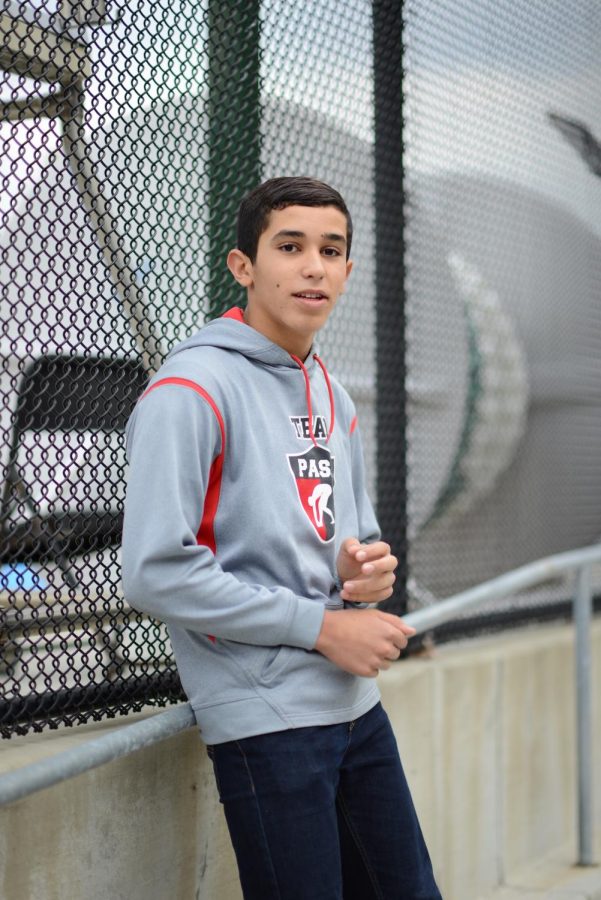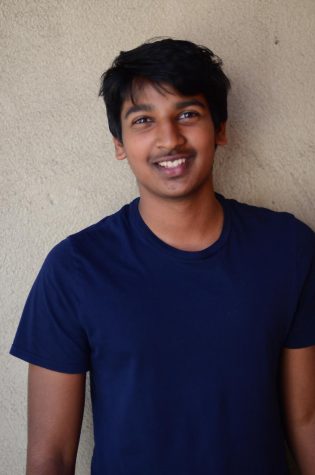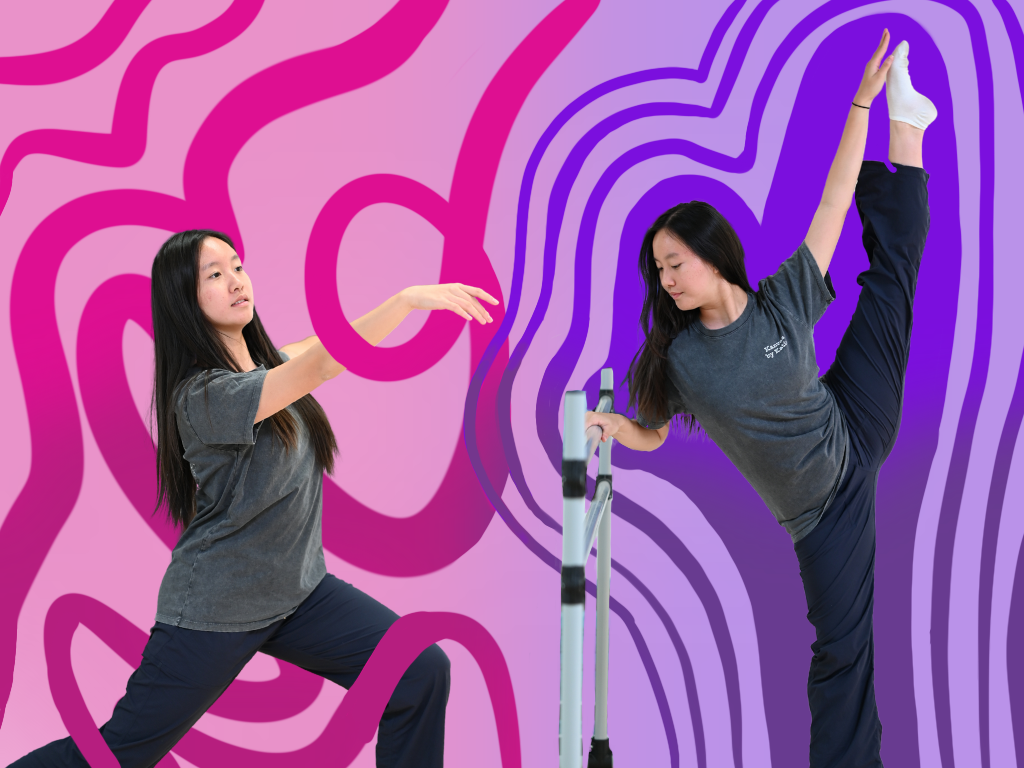Humans of Harker: Yannick Bohbot-Dridi finds purpose in the water
“We went up to San Francisco at 4 a.m. in the morning,” Yannick Bohbot-Dridi (12) said. “We got off a boat that dropped us off under the Golden Gate Bridge with some 300 other people who are cancer survivors and families of people who have faced cancer, and we swam in honor of everyone who had battled cancer. When we got into the water, we could barely breathe because it was so cold. It’s like that feeling when your lungs feel like they can’t expand. And you can’t see anything. You can’t even see a couple feet in front of you — I couldn’t even see the swimmers in front of me, nothing. Every ten or so strokes, you have to lift yourself out the water and tread water a bit to see where you’re at. I knew that doing this, on paper, had very little benefit towards me. I was swimming in the bay in the freezing cold bay on a Sunday morning. At the beginning, I thought, ‘Yeah, I’m just going to help people,’ but I did not expect to feel so happy after. I just felt grateful.”
December 6, 2017
A series of splashes sends ripples of waves through the water as Yannick Bohbot-Dridi (12) speeds across the pool. His body is a well-oiled machine, refined and optimized through extensive practice.
“You feel kind of free, at least that’s how I feel,” Yannick said. “No one can see the emotions on your face. It’s really just you in the water, and the sound of the water going by your ears is just really kind of comforting.”
He fidgets with the sleeve of his PASA sweatshirt as he talks, rocking back and forth on his heels. His friends know him for this underlying energy, bordering on hyperactivity.
“Yannick is very energetic and amusing and all over the place. He’s overly energetic if we’re being realistic here,” his close friend Felix Roman (12) said. “I remember during the promotion party for 8th grade, he was dancing all over the place and I was going to tell him that it was getting boring, but I couldn’t find him ‘cause he was off someplace doing the Thriller.”
He channels his energy into his three-hour-a-day training sessions, joking that he’s always swimming, sleeping or doing homework. Through swimming butterfly — often regarded as the most difficult stroke — he has developed mental toughness as well as physical strength.
“It feels like you’re gliding on top of the water with every stroke,” he said. “In butterfly, it’s either you go fast or you can’t swim it, and that’s what I like about it — it always has to be all-out.”
But Yannick didn’t always love swimming.
“Up until the end of sophomore year, swimming was fun, but I didn’t like the hard workouts,” he said. “I didn’t feel like this was going to be a sport that I could pursue. When I started growing, it became a little easier to keep up, and also, after watching the 2016 Olympics, I realized that hard work is the only key to being successful in a sport like swimming. I wasn’t really looking for success before, I was just doing it just because. I mean, I would be pushed by my friends, occasionally my parents and my coaches, but in the beginning of the junior year, it became something that was driven by me. That’s when I started enjoying everything, and that’s when I started to get better.”
Junior year marked another turning point: the first year Yannick participated in Swim Across America. Through this event, over the past two years, he and his friends have raised $20,000 for the UCSF Children’s Hospital for cancer research.
“We [went] up to San Francisco at 4 a.m. in the morning,” Yannick said. “We [went] off a boat that [dropped] us off under the Golden Gate Bridge with some 300 other people who are cancer survivors and families of people who have faced cancer, and we [swam] in honor of everyone who has battled cancer.”
After taking the frightful leap off the boat into the San Francisco Bay, Yannick immediately felt a rush of cold. But soon, his instincts took over.
“When we got into the water, we could barely breathe because it was so cold,” he said. “It’s like that feeling when your lungs feel like they can’t expand. And you can’t see anything. You can’t even see a couple feet in front of you — I couldn’t even see the swimmers in front of me, nothing. Every ten or so strokes, you have to lift yourself out the water and tread water a bit to see where you’re at.”
Vision muddled by the murky waters of the bay, Yannick took his mind off the swim itself and contemplated the greater purpose: pushing through adversity in solidarity of cancer survivors and their families who had done the same.
“Even though it was a small act, it was still something,” he said. “I’ve always focused on myself while I was swimming, and I never thought that I would be able to use that skill to help others. I knew that doing this, on paper, had very little benefit towards me. I was swimming in the bay in the freezing cold bay on a Sunday morning. At the beginning, I thought, ‘Yeah, I’m just going to help people,’ but I did not expect to feel so happy after. I just felt grateful.”
At first glance, Yannick, with his cheerful personality, may seem like a stereotypical athlete who’s caught up in superficial accomplishments and unaware of the gravity of real problems. However, he finds true satisfaction through applying his skills to help others. He eventually hopes to pursue a career in medicine.
“He’s one of the most caring people I know,” his friend Anastasia Cheplansky (12) said. “He always tries to makes sure that everyone’s doing okay and that they’re happy. There was something that I was really upset about over the summer, and he would call me every single day to make sure that I was okay and cheer me up.”
His sister, Hannah Bohbot-Dridi (9), shares this sentiment.
“When I was really little, he would push me around, so that I would start walking, and we could play together,” she said. “I always remember times like that where he pushed me to be my best. He still does it today.”
Additional reporting by Humans of Harker managing editor Melissa Kwan.


















![“[Building nerf blasters] became this outlet of creativity for me that hasn't been matched by anything else. The process [of] making a build complete to your desire is such a painstakingly difficult process, but I've had to learn from [the skills needed from] soldering to proper painting. There's so many different options for everything, if you think about it, it exists. The best part is [that] if it doesn't exist, you can build it yourself," Ishaan Parate said.](https://harkeraquila.com/wp-content/uploads/2022/08/DSC_8149-900x604.jpg)




![“When I came into high school, I was ready to be a follower. But DECA was a game changer for me. It helped me overcome my fear of public speaking, and it's played such a major role in who I've become today. To be able to successfully lead a chapter of 150 students, an officer team and be one of the upperclassmen I once really admired is something I'm [really] proud of,” Anvitha Tummala ('21) said.](https://harkeraquila.com/wp-content/uploads/2021/07/Screen-Shot-2021-07-25-at-9.50.05-AM-900x594.png)







![“I think getting up in the morning and having a sense of purpose [is exciting]. I think without a certain amount of drive, life is kind of obsolete and mundane, and I think having that every single day is what makes each day unique and kind of makes life exciting,” Neymika Jain (12) said.](https://harkeraquila.com/wp-content/uploads/2017/06/Screen-Shot-2017-06-03-at-4.54.16-PM.png)








![“My slogan is ‘slow feet, don’t eat, and I’m hungry.’ You need to run fast to get where you are–you aren't going to get those championships if you aren't fast,” Angel Cervantes (12) said. “I want to do well in school on my tests and in track and win championships for my team. I live by that, [and] I can do that anywhere: in the classroom or on the field.”](https://harkeraquila.com/wp-content/uploads/2018/06/DSC5146-900x601.jpg)
![“[Volleyball has] taught me how to fall correctly, and another thing it taught is that you don’t have to be the best at something to be good at it. If you just hit the ball in a smart way, then it still scores points and you’re good at it. You could be a background player and still make a much bigger impact on the team than you would think,” Anya Gert (’20) said.](https://harkeraquila.com/wp-content/uploads/2020/06/AnnaGert_JinTuan_HoHPhotoEdited-600x900.jpeg)

![“I'm not nearly there yet, but [my confidence has] definitely been getting better since I was pretty shy and timid coming into Harker my freshman year. I know that there's a lot of people that are really confident in what they do, and I really admire them. Everyone's so driven and that has really pushed me to kind of try to find my own place in high school and be more confident,” Alyssa Huang (’20) said.](https://harkeraquila.com/wp-content/uploads/2020/06/AlyssaHuang_EmilyChen_HoHPhoto-900x749.jpeg)











